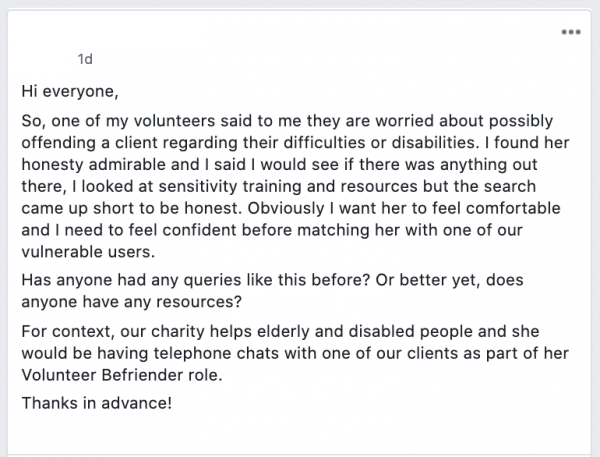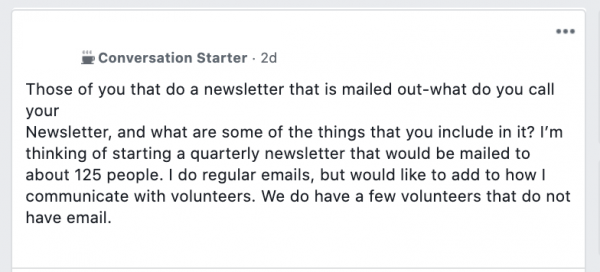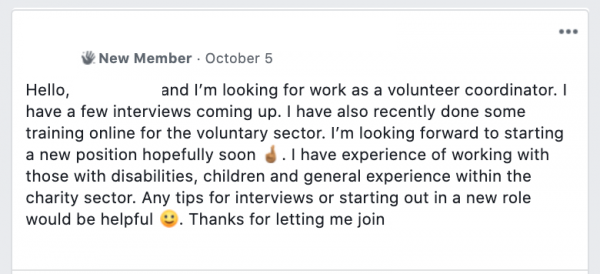Volunteer Coordinator Resource Community Recap 10/5 - 10/12
This week we had a Volunteer Coordinator who shared a very heartfelt concern from one of her volunteers, which many organizations might be able to appreciate and empathize with. For organizations that deal with vulnerable clients, sensitivity training or at least a conversation about how to handle sensitive situations are a must.
These sensitive situations could be when trying to interact with the elderly, those with memory issues, those with physical disabilities, those with mental disabilities, and those who are victims of certain acts.
Luckily, there are so many organizations that cater to these vulnerable individuals. Volunteers may have an idea of how to interact with them and prevent any more harm, but some volunteers may not. These volunteers who do not have experience with sensitive situations should not be discredited, they do want to help and learn after all.
So, how exactly can you prepare volunteers for vulnerable clientele, and what sort of sensitivity training can cover all of the things volunteers may experience while working with sensitive situations?
That’s exactly what one volunteer came to the Volunteer Coordinator Resource Community about this week.

Here’s Some Advice From The Comments For Volunteer Sensitivity Training & Encouragement
Bring a community professional that deals with your clientele in for an education session on those with disabilities or certain issues that may arise. Have them help volunteers understand the mindset of the clientele better and be educated about what to do and what not to do. (This can be done in a Zoom Meeting too!)
“I think it can be a great idea to have that conversation with those we're helping if we feel there's any chance of someone getting offended. Simply letting a person know that you would never intentionally do or say anything to offend them and asking them to let you know if anything does ever offend them and how to be better is a solid place to start any relationship.”
“I do regular training with my volunteers about etiquette when meeting people with disabilities, and information about the Americans with Disabilities Act.”
Include a quiz in your volunteer orientations or info sessions that help newer volunteers feel comfortable asking for help or training in this department.
If you have anything you would like to add for others in the community to learn, comment here!
Resources on Volunteer Sensitivity and Training
ESCAP - Empowering Persons With Disabilities in the Context of COVID-19
Friends Connecting People With Disabilities and Community Members
In the Volunteer Coordinator Resource Community, we have covered the topic of Volunteer Newsletters a bit. We know that they are helpful in engaging your volunteers, especially during the pandemic.
But this week’s engaging topic was actually on what to name the volunteer newsletter, which we completely understand! We have just come up with our new newsletter, and picking out a name for it was quite hard!
You want your volunteer newsletter to be engaging, and if you feel like it matches the vibe of the volunteer program, you can have a bit of fun with the name of your volunteer newsletter!

Some Ideas From The Comments:
“I call mine “Heart and Soul” since that’s what volunteers are to our organization.”
“We don't do a printed newsletter, but we do a weekly volunteer bulletin to out 1,100 volunteers. It includes upcoming dates, news from the various programs/centre updates, upcoming events of interest or community events that are raising funds for us, success stories of the people we assist, volunteer shout outs (celebrating the work of an individual or team of our volunteers), and weekly video update from our CEO and VE Manager.”
“Volunteer Happenings”
“News You Can Use”
“Our volunteers are called STARS, so our newsletter is Constellations... where STARS meet.”
Think about certain things your volunteers may have in common, a pun with your volunteer program name, or a play on words of what your newsletter delivers.”
Resources For Volunteer Newsletters
If you have anything tips or ideas for volunteer newsletter names or content - comment here!
And lastly this week, we had a new Volunteer Coordinator who was asking for advice or tips when it came to being a Volunteer Coordinator. What a great place to ask for tips!
Being a Volunteer Coordinator is definitely not an easy job, so these tips are a great way to express advice that is only learned the hard way!

Some helpful tips from the comments section:
“I went into my interview with not only my resume but a portfolio of my work (as it pertained to the new job) and a 5-year plan because I was tasked with building a program from scratch. Showing initiative and ideas when you’re going to be in charge of a large program is always great! Also, ask a friend or colleague to do mock interviews with you in advance to help prepare and soothe some of those nerves. There’s a lot of common interview questions that always get asked you can look up online!”
“Be yourself! Always important. We can train skills but not personality and fit for the org.”
“Be prepared with specific stories of the work that you have done and the outcome. Don’t be afraid to “brag” on yourself a little.”
Be prepared to explain how you will engage volunteers virtually.
“Let your passion for working with volunteers and helping a worthwhile organization succeed and shine. This is a skill that not everyone can do.”
“Be yourself. Ask questions for clarity and don't BS. It isn't always about the right answer bit about your thought process.”
“Having ideas on how to transition standard volunteering into today's environment.”
Resources for Getting A Volunteer Coordinator Job
 Last updated by
Last updated by